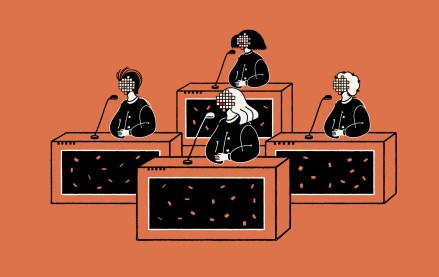AI Briefing: Gale debuts generative AI platform for media-buying

Since the generative AI boom began, advertising holding companies and independent agencies have raced to develop their own platforms. Now, another agency has entered the race with its own AI platform focused on media-buying, sales, strategy and other operations.
Stagwell Inc.-owned Gale has a new platform called Alchemy.AI, evolved from the media agency’s previous Alchemy platform that also had its own internally built machine learning models. While numerous agencies have debuted new generative AI offerings built with large language models (LLMs), Gale founder and CEO Brad Simms said the agency wanted to make sure it had all the right safeguards in place. For example, he said Alchemy.AI was developed to be ISO-compliant and also adhere to strict data standards in Europe and California.
“It’s one of the reasons why some might say we were late to the AI conversation,” said Simms, who founded Gale in 2014. “But I would say we were cautious to ensure the safeguards existed that allowed us to operationalize it in the way our clients would expect. I’m not so sure if we were sitting here a year ago that either of us would have been confident in the enterprise security of those LLMs.”
As part of Stagwell’s agency network, Gale also is able to tap into the various AI investments made by the holding company. For example, it’s able to benefit from a 2023 deal between Stagwell and Google Cloud that focuses on marketing-related solutions for generative AI. Other agency holding companies — including Publicis Groupe, WPP and IPG — also have debuted new AI platforms and partnerships with various companies in recent months.
Trained on both first- and third-party data, Alchemy.AI also includes features for both sales strategies and media planning. It can create custom audiences, analyze past ad campaign results, develop strategies for future campaigns, and provide insights about customer loyalty. For example, it can compare sales data from loyalty and non-loyalty customers, suggest areas for reinvestment, and analyze rates of customer acquisition and retention. The platform also has ways to turn CRM data — from external partners, a brand’s owned platforms and transactional data — to help develop campaigns across various platforms. Other features include tools for data visualization, business development, project management, HR tasks and other operations.
To develop Alchemy.AI, the agency made enterprise deals with several major AI companies — including Google, OpenAI and Anthropic — which provide API access to their AI models powering chatbots like Gemini, ChatGPT, and Claude. By abstracting Alchemy.AI’s backend and frontend, Gale also made it easier to switch between AI models and between cloud providers. Along with allowing multiple users within any given AI chat, the approach also makes it easier to switch between AI models — which could be especially helpful when LLM performance varies or if a company has data in different places.
Alchemy.AI also has a scenario-planning feature for both media planners and non-media buyers. While other companies also have their own scenario planning tools, Simms argued that Gale’s platform allows it to take a more agnostic approach to remove bias when it comes to suggesting media spend.
When asked about how much historical data is required to train Alchemy.AI, Simms said it’s ideal for clients to use at least two years of performance data when optimizing owned media, and ideally three years for paid media. The process of onboarding clients to Alchemy.AI also takes a lot of time and effort, according to Simms. While the first few clients took four weeks, he said the process now takes between three and five days.
Having a more objective perspective could help advertisers better gauge performance across various advertising platforms. That might be appealing as more advertisers worry about the opacity of AI offerings on platforms like Google’s Performance Max and Meta’s Advantage Plus.
“I’m not saying any media company does it intentionally, but it’s always a question we get from our clients,” Simms said. “How independent and agnostic is this recommendation?…If you’re in a client environment and the media plan is in there and it’s been created, you can actually just go in there and [ask] What if the client has two more million?’”
Beyond just the agencies building new platforms, outside experts also say AI will reshape advertising budgets. And while some expect the current AI hype to subside, analysts expect AI will continue to reshape advertising budgets. Last week, Tim Nollen, a Senior Media Tech Analyst at Macquarie, told Yahoo Finance that adtech firms like AppLovin and The Trade Desk could also benefit from the shifts.
Integrating multiple AI models in a single platform is something more companies are pursuing. Along with enhancing tools, it also lets companies have stopgaps for whenever a large language model has issues. New AI and privacy laws including Europe’s newly approved AI Act are also leading companies to make sure they boost both safety measures and capabilities.
Procuring or building AI platforms also requires a different approach than other tech stacks, said Nitish Mittal, a partner at the IT research consultancy Everest Group. He added that the very nature of LLMs and data will lead to “new era of multi-LLMs.”
“AI is not just one small thing,” Mittal told Digiday. “It has everything to do from hardware to software, data to services, so you need to stitch that together. You almost need a new special vehicle to be able to do this.”
Improving data privacy measures for LLMs also requires new approaches to how companies collect, store and use data. That’s also leading companies to integrate privacy by design when building new tools. During an online panel last week after the AI Act’s approval by European Parliament, IBM Chief Privacy & Trust Officer Christina Montgomery said it’s important for companies to document the data used to train their AI models and how it was captured.
“How do you develop user documentation then that will help to explain and provide instructions for use of those algorithms for your clients and the like,” she said. “Then over the lifecycle, how are you monitoring your AI because it will change over time?”
Prompts and Products — AI news and announcements
- The European Parliament passed the AI Act, a comprehensive law with guardrails for how companies develop and deploy AI systems.
- An agency’s new AI-powered commercial for Under Armour sparked fresh controversy around generative AI tools trained on previously produced brand assets.
- Prescient AI, which uses machine learning models to improve media measurement for e-commerce brands, announced it raised $10 million in additional funding.
- The Wall Street Journal’s interview with OpenAI’s CTO led many to wonder what the startup’s Sora model was trained on.
- OpenAI announced new deals with European publishers Le Monde and Prisa Media.
- Two U.S. Senators introduced new bipartisan legislation that would create new guidelines for AI ahead of U.S. elections.
- The Aspen Institute will host an event on March 28 focused on AI and the elections. Speakers include former U.S. secretary of state Hillary Rodham Clinton, Google co-founder Eric Schmidt, and various other top officials from the U.S. and European Union.
- Grok, an AI model developed by Elon Musk’s AI startup xAI, released the model’s code to make it open-source.
- Reddit said the Federal Trade Commission is probing how the platform’s user-generated content is sold, licensed or shared with other companies for use in training AI models. Reddit revealed the inquiry in an updated securities filing ahead of its IPO, which is scheduled for this week.
- Several major conferences this week are expected to have AI news from various companies including Nvidia GTC, Shoptalk and Game Developers Conference (GDC).
Other stories from across Digiday
- WTF is Section 230?
- Research Briefing: Facebook loses favor with publishers, brands and agencies
- Media Briefing: Publishers use proprietary research to pitch prospective advertisers
- Future of TV Briefing: How outcome-based measurement may figure into this year’s upfront market
- Marketing Briefing: Renewed call to ban TikTok could push creators, ad dollars to YouTube Shorts and Instagram — which may hurt creators
- With UTA, Michael Kassan skirmish, why do Hollywood and Madison Avenue make for strange bedfellows?
More in Media Buying

Speculation continues to swirl over a possible WPP breakup
Sources moot a potential sell-off of individual agency assets as the agency holding group pushes ahead with turnaround plan.

Influencer agency Billion Dollar Boy offers creators a membership program, with benefits
Influencer agency Billion Dollar Boy on Thursday is launching a creator community membership as it expands its consultative services and partnerships, Digiday has learned.

Media Buying Briefing: Can agencies help brands expand gaming and esports as women’s sports shine?
As women’s sports continue to capture audiences through March Madness and soccer, will agencies and brands be able to channel some of that momentum in the growing esports and gaming spaces?








